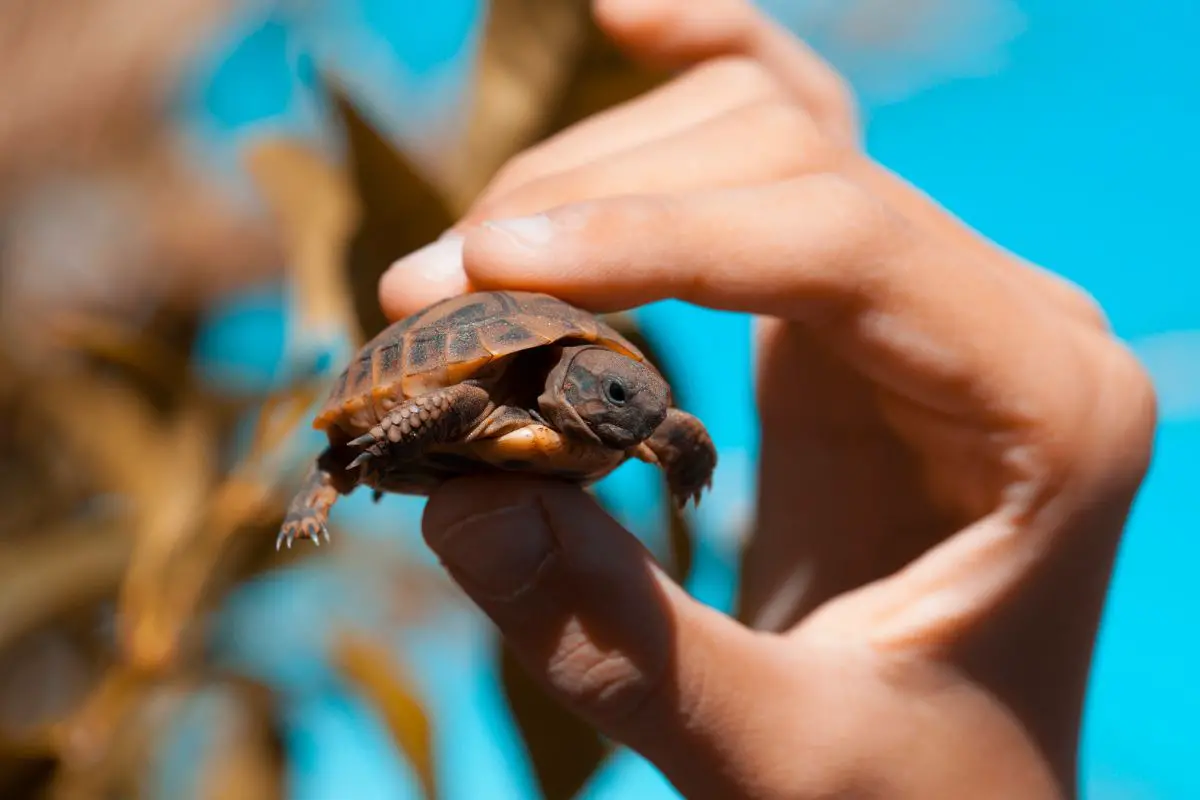When I was a kid, I remember seeing turtles in the pet shop and thinking, those things are tiny! I had no idea then, that there were many types of turtles and that they could be large, small, and everything in between.
Small turtles are easy to care for and can be a great first pet for those that want a low-maintenance pet, that has a ton of personality.
Tip – Baby turtles grow into full-sized turtles, so make sure that you are choosing a turtle based on its full adult size if you want it to remain small.
Small types of turtles include many species, that all have different needs, behavior, and living conditions. So let’s look at 14 small turtles that will have you oohing and awwing for days!
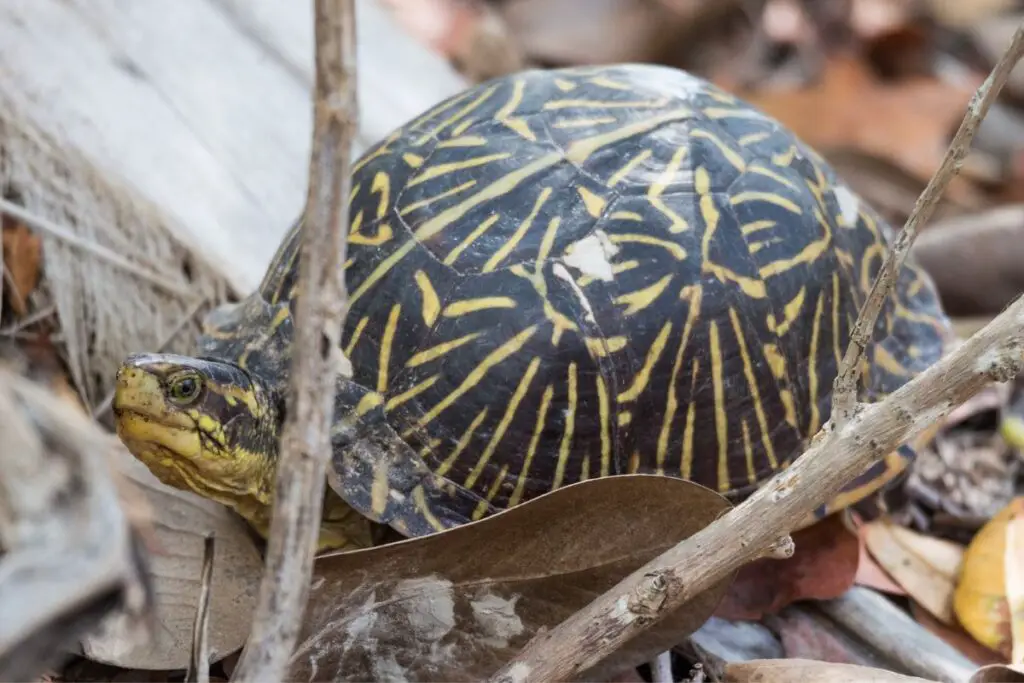
Number One: Ornate Box Turtle
The ornate box (Trachemys scripta scripta) turtle is a beautiful small box turtle, that has an interesting design on the top of its shell. Box turtles are unique in multiple ways, one of them being that they are able to close themselves up completely inside of their shells, gaining them the name “box turtle.”
| Feature | Ornate Box Turtles |
| Weight | 05 – 1.5 lbs |
| Size | 2 – 6 inches |
| Lifespan | 30 – 40 years |
| Cost | $200 – $1,000+ |
| Habitat | Terrestrial |
These turtles make great pets because they are small and easy to care for. Ornate box turtles, and box turtles in general, do not go into the water as often as some other turtle species. Which makes caring for them and cleaning up after them easier than some turtle species.
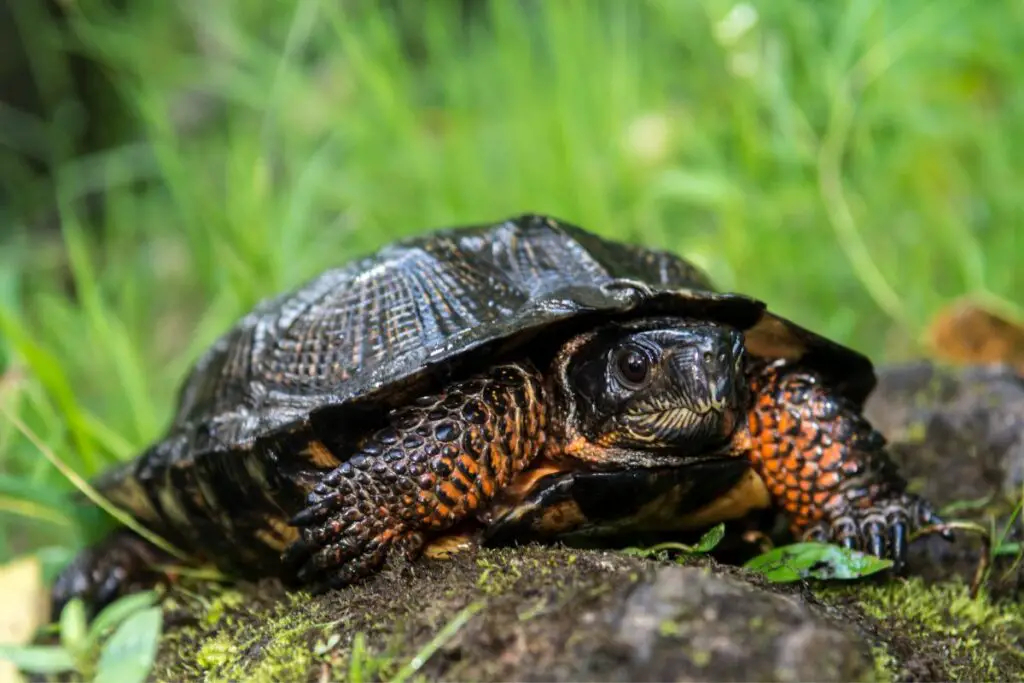
Number Two: North American Wood Turtle
The North American wood turtle (Glyptemys insculpta) is black, brown, tan, and gray in color, sometimes with light markings.
They are considered tame and friendly and make great pets. They are not the smallest turtle on this list, but they are small and manageable, although, some have been reported as being as large as 1 ft in diameter.
| Feature | North American Wood Turtle |
| Weight | 1.5 – 2.5 lbs |
| Size | 5 – 9 inches |
| Lifespan | 40 – 60 years |
| Cost | $50 – $300+ |
| Habitat | Semi-aquatic |
In the wild, wood turtles eat slugs, worms, insects, tadpoles, vegetation, fruits, and carrion. Pet wood turtles can be fed a variety of fruits such as raspberries, blueberries, blackberries, and more.
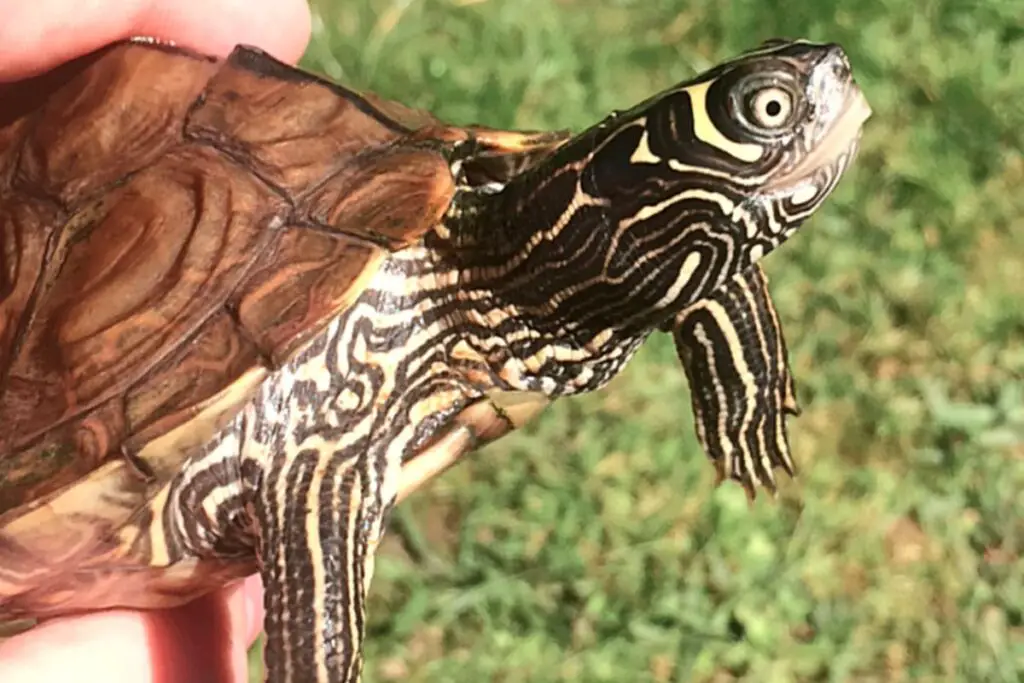
Number Three: Mississippi Map Turtle
The Mississippi map turtle (Graptemys pseudogeographica kohnii) is one of 14 species of map turtle. They can be found in Texas, Arkansas, Louisiana, and Mississippi. You can find these little turtles along the Missouri River, as well as in states like Wisconsin, North Dakota, Minnesota, Illinois, Ohio, and Indiana.
| Feature | Mississippi Map Turtle |
| Weight | 14 – 17.5 ounces |
| Size | 3.5 – 10 inches |
| Lifespan | 15 – 20 years |
| Cost | $50 – $200+ |
| Habitat | Semi-aquatic |
Map turtles vary in size depending on if they are male or female. Males are typically much smaller than females, coming in at around 3.5 inches, while female Mississippi map turtles can be as large as 10 inches!
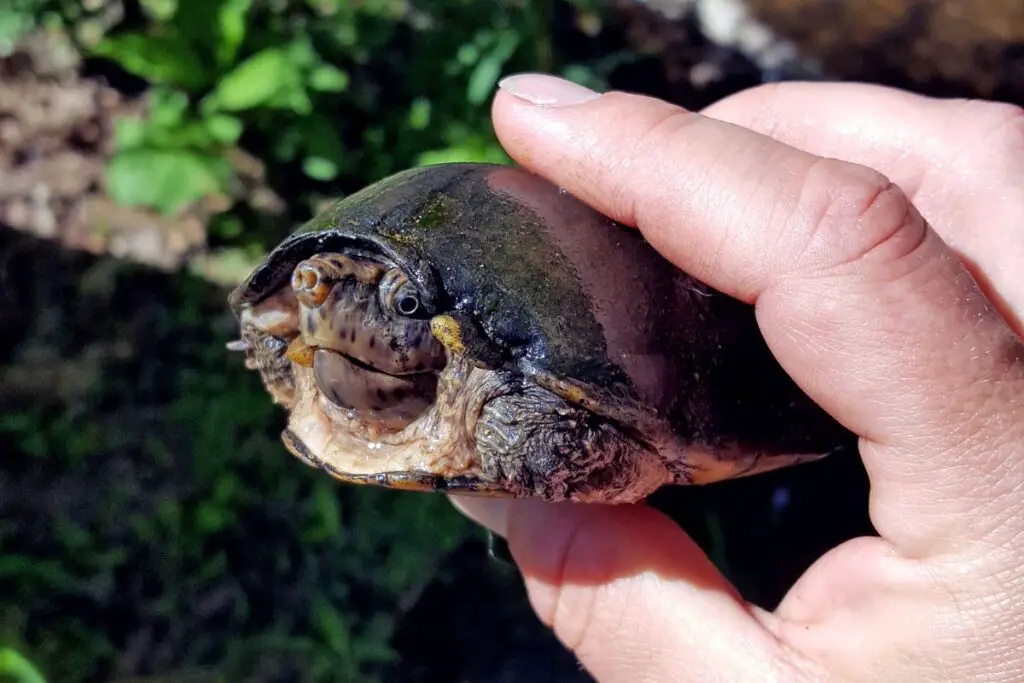
Number Four: Musk Turtle
Musk turtles (Sternotherus odoratus) are small turtles that can be kept as pets. Even though they are small turtles, they live for a long time (up to 60 years) which requires quite a bit of commitment.
| Feature | Musk Turtle |
| Weight | 1 – 3 lbs |
| Size | 2 – 4.5 inches |
| Lifespan | 40 – 60 years |
| Cost | $20 – $200+ |
| Habitat | Semi-aquatic |
Musk turtles are widely known for their unique defensive adaptation, where they secrete a yellow liquid that has a foul odor. This helps them avoid predators in the wild and contributed to their name “musk” turtle. The musky odor comes from two glands beneath the carapace.
Musk turtles have a dome-shaped shell, which insulates them. This helps them regulate their body temperature better than some other turtles, such as soft-shell turtles with flat shells.
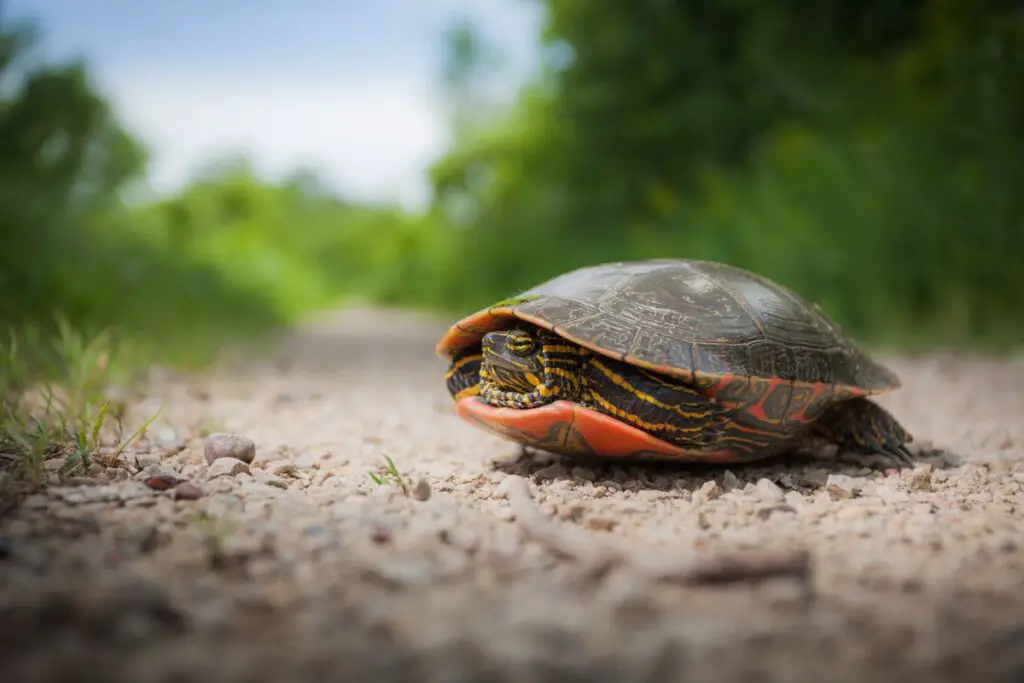
Number Five: Painted Turtle
Painted turtles (Chrysemys picta) are small turtles that can be kept as pets. They are easy to care for and great for beginners. Turtles should always be acquired from a pet store and never taken from out in the wild.
| Feature | Painted Turtle |
| Weight | 11 – 18 oz |
| Size | 5 – 6 inches |
| Lifespan | 20 – 40 years |
| Cost | $15 – $150+ |
| Habitat | Semi-aquatic |
These turtles are known for being docile, which is what makes them great beginner pets. There are many species of painted turtle, such as the eastern painted turtle, that occupy territories from southwestern Canada to Alabama.
Other species, such as the midland painted turtle can be found in Quebec, down to Tennessee. When it comes to distribution, the painted turtle is known as one of the most widespread turtles in the North American continent.
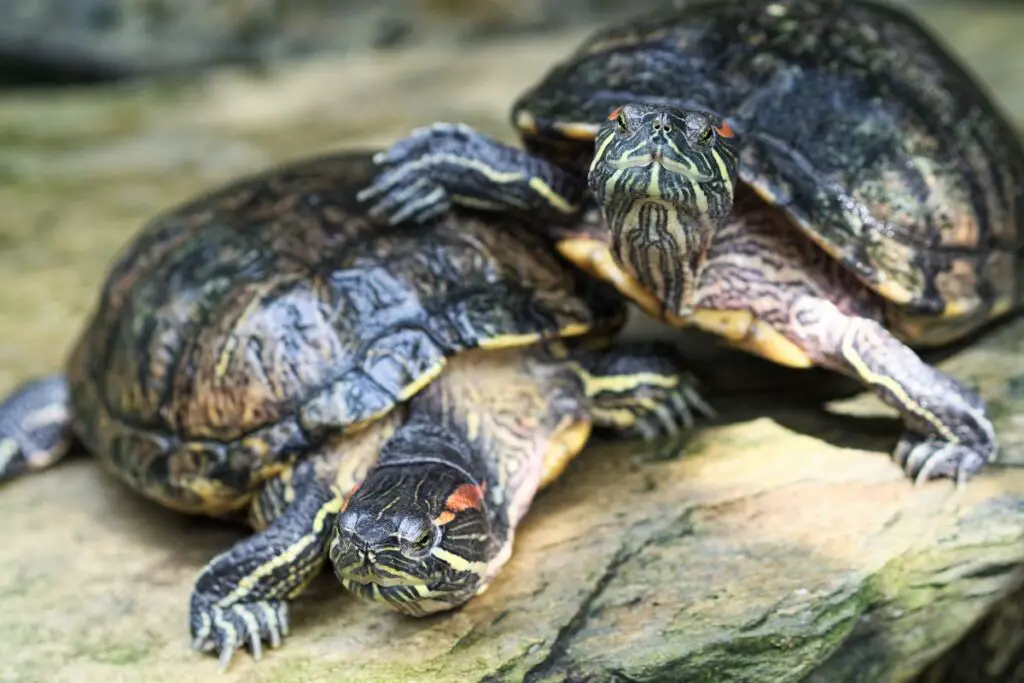
Number Six: Red-Eared Slider
The red-eared slider (Trachemys scripta elegans) turtle, comes from a group of turtles known as sliders. These are smaller-sized turtles that were very popular as pets in the 70s. However, as it were, an outbreak of salmonella was traced back to these turtles and other small turtle breeds.
| Feature | Red-Eared Slider |
| Weight | 6 – 8.5 oz |
| Size | 5 – 12 inches |
| Lifespan | 10 – 30 years |
| Cost | $15 – $120+ |
| Habitat | Semi-aquatic |
This is why if you own a small turtle you should try to avoid touching them or holding them, and if you must, then wash your hands after. Red-eared sliders that are under 4 inches in size are illegal to own as pets.
Even though it is hard to get these little fellas as pets, people still acquire them at pet shops, herpetological shows, and other means. They need to have a proper terrarium and the right heating, lighting, and environment.
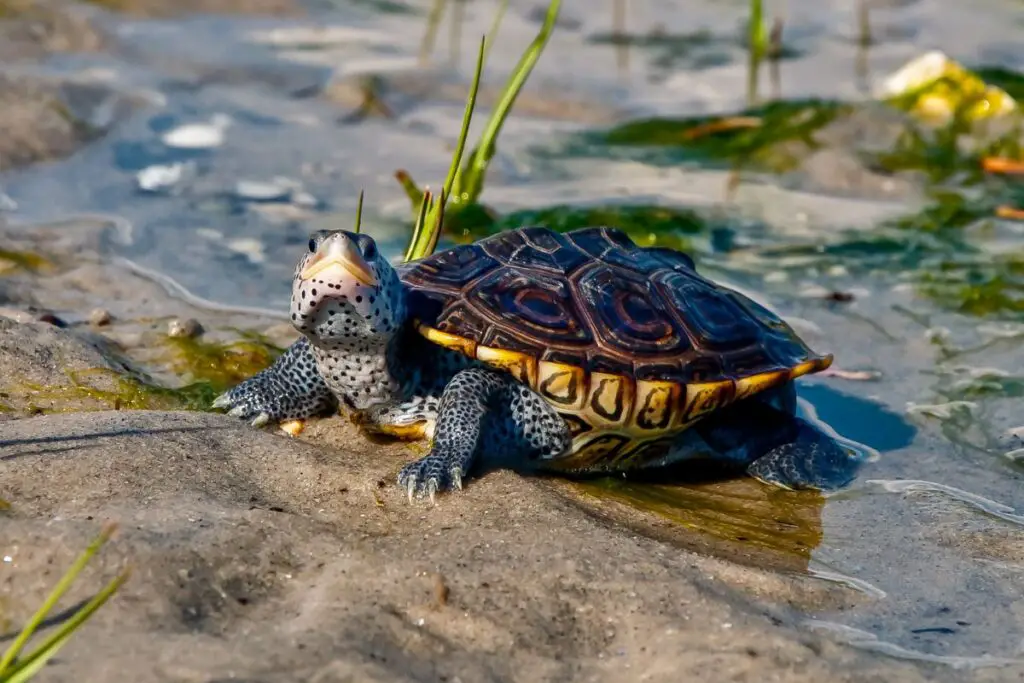
Number Seven: Diamondback Terrapin
The Diamondback terrapin (Malaclemys terrapin) is a small type of turtle that is mostly native to saltwater marshes and lagoons in the United States. These aquatic turtles have diamond shapes on the top of their shells.
In his book, Turtles, The Animal Answer Guide, Whit Gibbons says that “terrapin” is a Native American word.
The Algonquin tribe of northeastern North America used “terrapin” to mean “edible turtle.”
| Feature | Diamondback Terrapin |
| Weight | 8 oz – 1.5 lbs |
| Size | 5.5 – 9 inches |
| Lifespan | 25 – 40 years |
| Cost | $170 – $1,000 |
| Habitat | Aquatic |
Diamondback terrapins can be kept as pets in the U.S. as long as they are sourced from a licensed turtle breeder.
Did you know humans have been eating turtles for thousands of years? Check out our article called: What Eats a Turtle
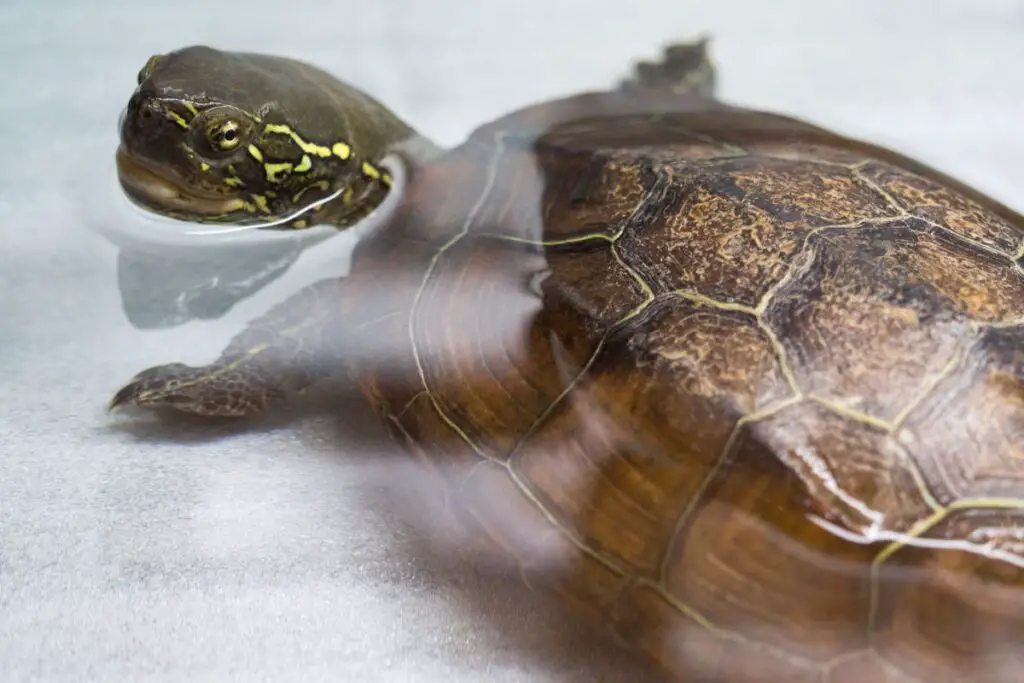
Number Eight: Reeve’s Turtle
The Reeve’s turtle (Mauremys reevesii) also known as the Chinese pond turtle, is a small turtle that is kept as a pet. These turtles are endangered, however, restrictions are limited to “wild” Reeve’s turtles.
| Feature | Reeve’s Turtle |
| Weight | 0.4 – 1 lbs |
| Size | 6 – 9 inches |
| Lifespan | 10 – 15 years |
| Cost | $99 – $300+ |
| Habitat | Aquatic |
These turtles make good pets, however, like most turtles, they require housing and equipment. These little turtles are known for having a lot of personality and that’s one reason they have been sought after.
Reeve’s turtles are probably not the first turtle on someone’s list, but they definitely have their place on this list of small types of turtles. And who knows, maybe they are your favorite!
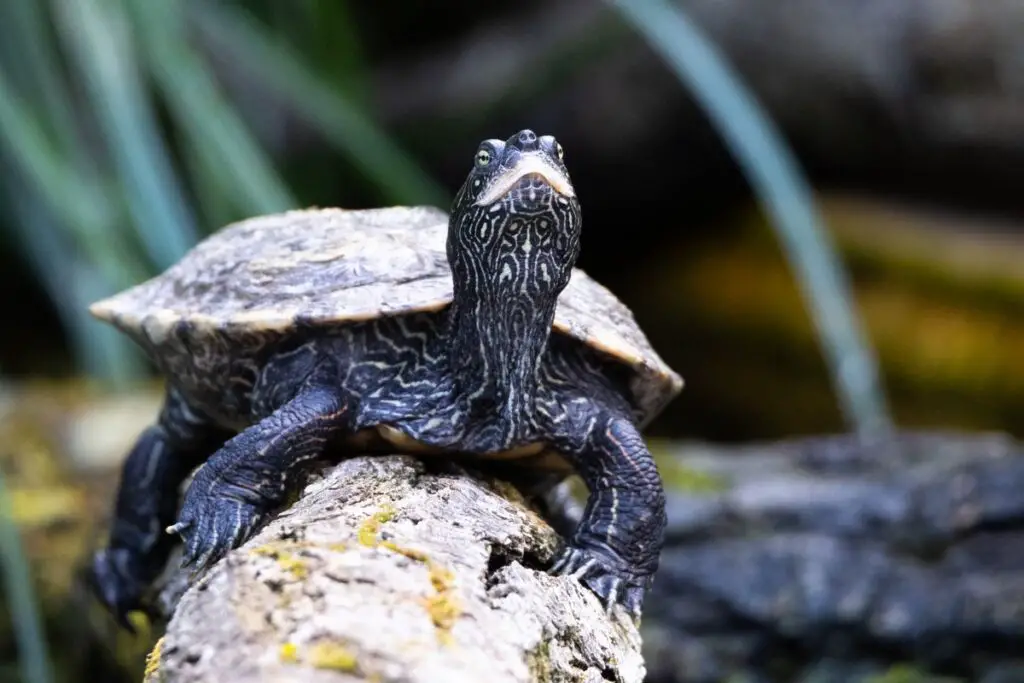
Number Nine: False Map Turtle
There are two main types of false map turtle (Graptemys pseudogeographica), the Graptemys Psuedogeographica, and the midwestern false map turtle. These two are interesting because they have different eye colors.
| Feature | False Map Turtle |
| Weight | 2.5 – 4 lbs |
| Size | 3.5 – 11 in |
| Lifespan | 15 – 35 years |
| Cost | $25 – $100+ |
| Habitat | Aquatic |
The main subspecies Graptemys has a yellow/brown iris with a black bar running through the pupil. While the midwestern subspecies have a white iris and a black pupil with no bar. False map turtles are also called sawback turtles.
False map turtles are small turtles that fall under the docile pet category. These turtles will not hurt, bite, or put you in danger. (Always make sure to wash your hands after handling them.)
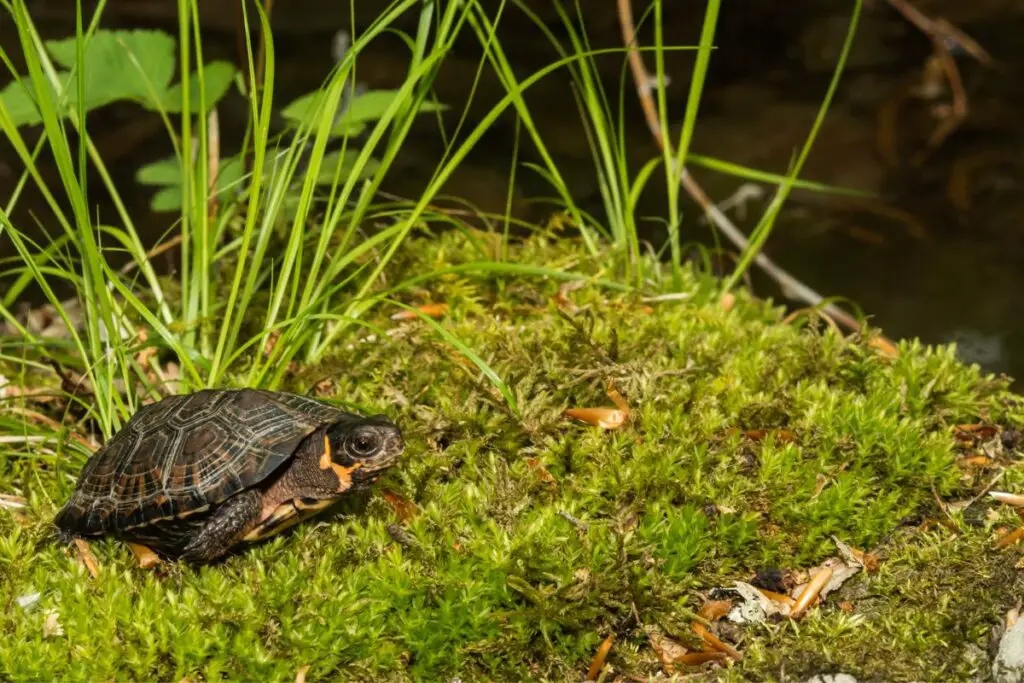
Number Ten: Bog Turtle
The bog turtle (Glyptemys muhlenbergii) is perhaps one of the smallest turtles from North America, on this list. They max out at around 4.5 inches. They have a bright blotch on each side of their cheeks. Male bogs are usually larger than females and the males also have longer tails.
| Feature | Bog Turtle |
| Weight | 4 oz |
| Size | 4.5 in |
| Lifespan | 40 years |
| Cost | $250 – $1,200+ |
| Habitat | Semi-aquatic |
The size of this turtle is what makes it one of the most sought-after, however, these turtles can be timid and are not the best for beginner turtle owners. Just like many other turtles, it can be illegal to buy them, so be careful about the local laws where you live.
In the wild, bog turtles are active in spring. In the hottest parts of the summer months, bog turtles will seek subterranean locations such as underground burrows and tunnels.
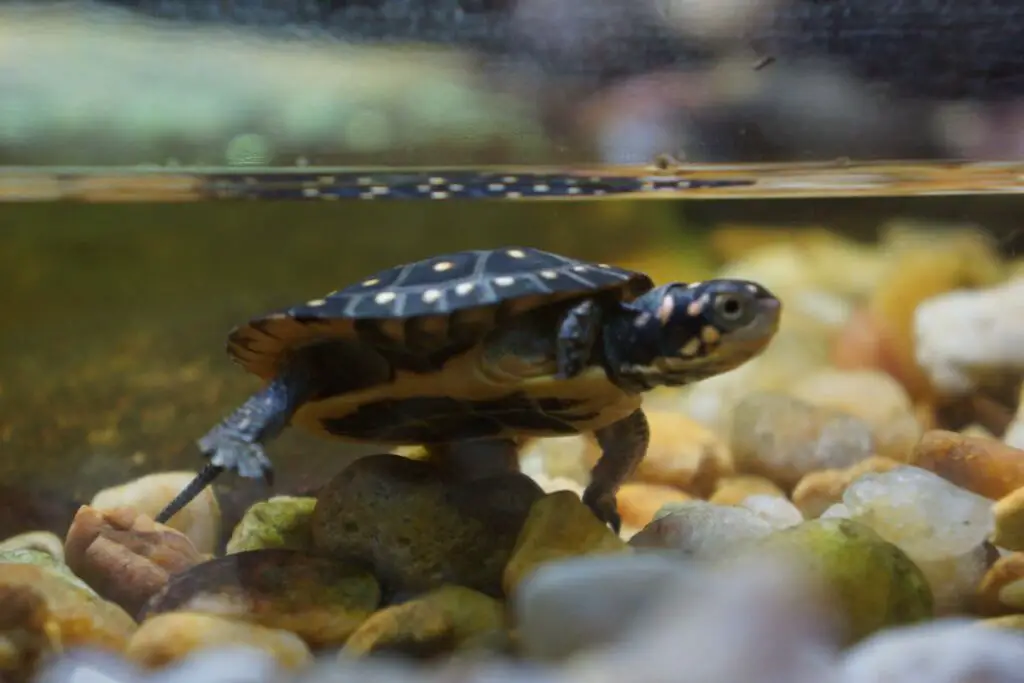
Number Eleven: Spotted Turtle
The spotted turtle (Clemmys guttata) is a type of small turtle that is great as a pet because it does not bite or act aggressively. They are small black turtles that have small round yellow spots in patterns on the top of their carapace.
| Feature | Spotted Turtle |
| Weight | 0.5 to 1 lb |
| Size | 4 to 5 in |
| Lifespan | 65 to 110 years |
| Cost | $100 – $200 |
| Habitat | Aquatic |
Spots on spotted turtles have been known to fade over time. In the wild spotted turtles occupy wetlands such as swamps, bogs, marshes, wet pastures, and fields.
Like many other turtles, they are not the best pets to hold. If you are like me, you just love to observe them! They have preferences and personalities, even though they are tiny turtles.
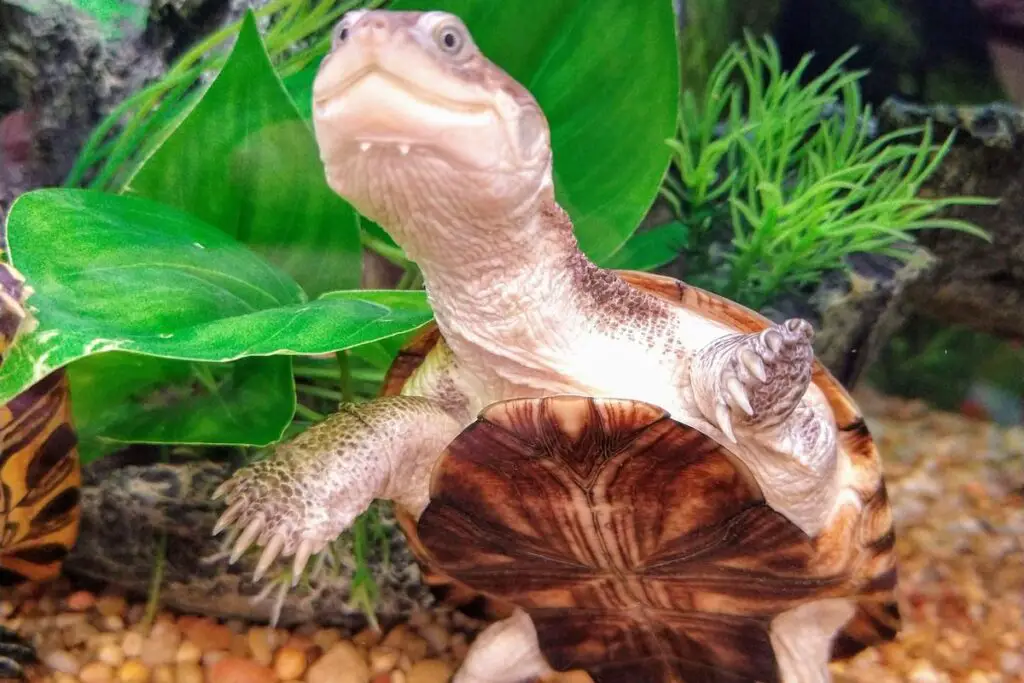
Number Twelve: African Sideneck Turtle
African sideneck turtles (Pelusios castaneus) have been known to be kept as pets. They are small turtles that can be easily cared for, however, they are not as small as some other turtles mentioned in this list.
| Feature | African Sideneck Turtle |
| Weight | 1.5 lb |
| Size | 9 to 11 in |
| Lifespan | 20 to 50 years |
| Cost | $50 – $100 |
| Habitat | Aquatic |
They have a lot of energy and personality, but can also be somewhat aggressive. They are curious and like to investigate just about anything. These turtles need a lot of attention and a little bit of maintenance.
African sideneck turtles mostly eat insects and worms. They love leafy greens like kale and spinach. These turtles are aquatic and are native to Africa. Many African side neck turtles are legal, in states like Oregon.
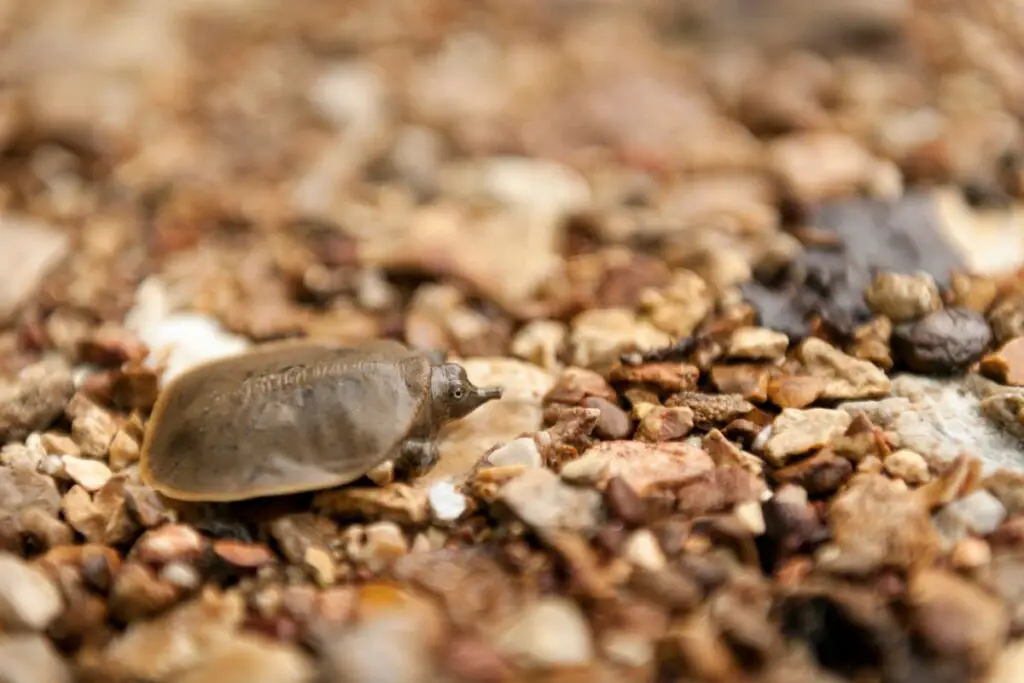
Number Thirteen: Spiny Turtle
Spiny turtles (Heosemys spinosa) are flat-bodied, soft-shelled turtles, that live in clear sandy creeks and waters. These turtles remind me of a big pancake with dark spots all over it. This is another type of small turtle that should not be handled. They have strong jaws that will bite you.
| Feature | Spiny Turtle |
| Weight | 1.5 to 33 lb |
| Size | 5 to 19 in |
| Lifespan | 50 years |
| Cost | $70 – $280 |
| Habitat | Aquatic |
The male spiny turtle has a longer and thicker tail than the female spiny turtle. These turtles are diurnal and are most active in the daytime. While they may not be the greatest pets, because they are aquatic and take a lot of maintenance, they still have great personalities.
In 1979 the Canadian Government put the spiny turtle on a postage stamp, how cool is that! The biggest drawback to owning a pet spiny turtle is the size of the tank, which needs to be around 75 gallons.
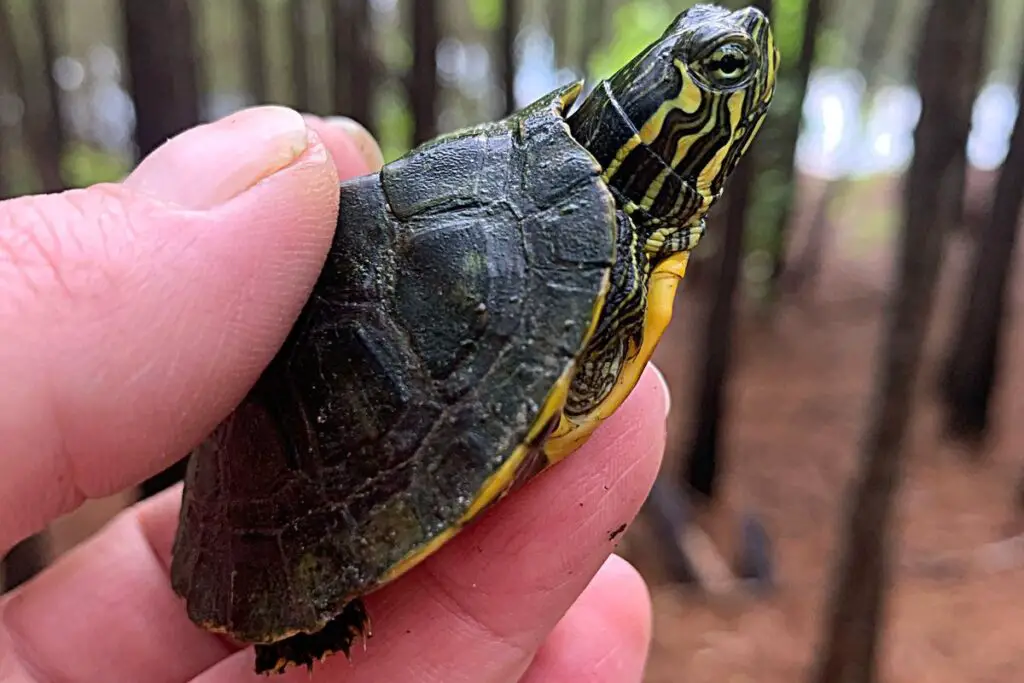
Number Fourteen: Yellow-Bellied Slider
The yellow-bellied slider (Trachemys scripta scripta) is another type of small slider turtle that makes a great pet. They can be easily identified by the yellow blotch around their eye, which is most prevalent in juveniles and females.
| Feature | Yellow-Bellied Slider |
| Weight | 8.5 oz |
| Size | 5 to 12 in |
| Lifespan | 30 to 50 years |
| Cost | $30 – $200 |
| Habitat | Semi-aquatic |
The bottom of the shell, known as the plastron, is yellow in color, and there are yellow stripes on the turtle’s forelegs legs. In the wild, the yellow-bellied sliders distribution covers a small portion of the southeastern United States. They can be found in Flordia, Virginia, and the Carolinas.
These small turtles are docile when kept alone, however, when put into pairs they can become aggressive. Even though they can look cute, you still do not want to hold these turtles, as they prefer not to be touched and to be left alone.
Small Types of Turtles: Final Thoughts
Many times we look at smaller animals and think they would make great pets, but as is the case with these smaller types of turtles, cute and small doesn’t always mean safe or legal.
We should always be diligent with animals, to make sure they are safe, we are safe, and everything is by the book. Many things about turtles amaze me, from their awesome turtle-shell-defenses to their longevity.
Now, next time you are in a pet store, you will be able to know a little bit about small turtles, so you can make an educated decision. Have fun out there, and in the words of my favorite cartoon characters from the 80s;
“Cowabunga! Dude!”
Additional Sources
Alderton, David,Turtles & Tortoises of the World, Blandford Press ; New York (1998)
Ernst, Carl H, Turtles of the United States and Canada,Washington : Smithsonian Institution Press (1994)
Patterson, Jordan, Red-eared Slider Turtles : With Information on Other Sliders,Neptune City, N.J. : T.F.H. Publications (1994)
- Hero Farm Dog Survives Epic Battle with Coyote Pack - December 9, 2024
- The 10-Minute Bedtime Routine That Changed My Dog’s Sleep Forever - November 29, 2024
- Creating a Safe Space for Nervous Pets: Your Guide to Pet-Friendly Havens - November 25, 2024

